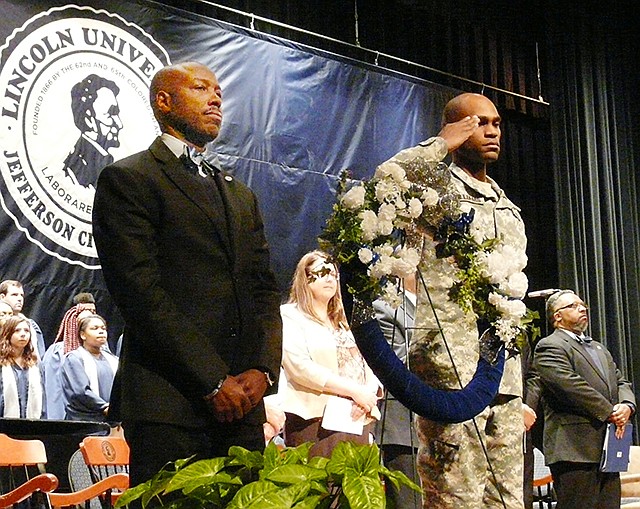Education has helped make America the greatest nation in the world, Chicago attorney George C. Howard Jr. told Lincoln University's Founders Day Convocation on Thursday.
Howard, a Kennett native, graduated from LU in 1956, then earned his law degree from Chicago's John Marshall Law School in 1961.
"I first came to Lincoln University shortly after I graduated from elementary school in Kennett" as part of a special visit, he recalled at the beginning of his hour-long address.
"The school that I graduated from was, at that time, a two-room, frame school with no playground equipment, outside restrooms or toilets. One teacher taught from the first to the fourth (grades), and the other teacher taught from the fifth to the eighth."
He went to high school in Hayti, because there was no high school for blacks in Dunklin County, "and I had to ride 18 miles and more, because my father was the bus driver and we had to go off the road and pick up the rural black children who lived on the farms."
When he came to Lincoln as a college freshman, Howard said, "I did not know that a few ex-slaves who ran away from their master and joined the Union army could look ahead and see the necessity of an education.
"They got together with their few dollars and put together a fund that started a school here in Jefferson City.
"And what most people overlook is that they had the idea and saw the necessity, not having the necessary education and sophistication, to do what was necessary."
Those soldiers were part of the 62nd and 65th Missouri Colored Infantry units, who launched the dream that became Lincoln University as they were being mustered out of the army in Texas after the end of the Civil War.
Most of those soldiers came from Missouri, a state that passed a law in 1847 prohibiting slaves from learning to read and write.
And their white officers thought those soldiers needed to learn to learn those skills.
A general order issued while the troops were in Louisiana read: "All noncommissioned officers of this command who shall fail to learn to read by or before the first day of January 1865 will be reduced in rank and their places filled by persons who can read."
Promotions to sergeant were to be based on a "preference to men who can both read and write and are otherwise good soldiers."
And, the order said, those men who already knew how to read and write were to "aid and assist to the extent of their ability" those who were trying to learn.
Howard noted that order said "no man is properly fitted to perform the duties of a free citizen" without having reading and writing skills.
When they pledged to found what now is Lincoln University, Howard said, "Those ex-slaves had come to the conclusion that education was 'the way.'"
He reported another part of that same general order said any soldier "found to be or to have been playing cards," was to be placed in the camp "with book in hand and required to learn a considerable lesson in reading and spelling."
After telling that history of LU's founding, Howard asked: "If these men had the wisdom to see the necessity of an education for a free people, to make America great, why are we still struggling with racism and all other kinds of isms?
Education was important in his own family, Howard said, explaining his slave-born grandfather, who became a Baptist minister in 1888, "started teaching black children in the Baptist Church."
Howard said he was invited back to his old high school in Hayti - by then converted into a middle school and given facilities, like a gymnasium, it didn't have when it was the high school for blacks.
His audience was a student body with blacks and whites together, unlike his own days of education, and he told those middle school students that day: "To see you here reminds me of the piano.
"You don't make music from the black keys alone (or) from the white keys alone.
"But when you play them both together, you can come out with some beautiful music - and that's the way the world is."
Howard told those attending LU's Founders Day Convocation Thursday: "You have inherited an obligation to do good."
And that begins with education, he said.

